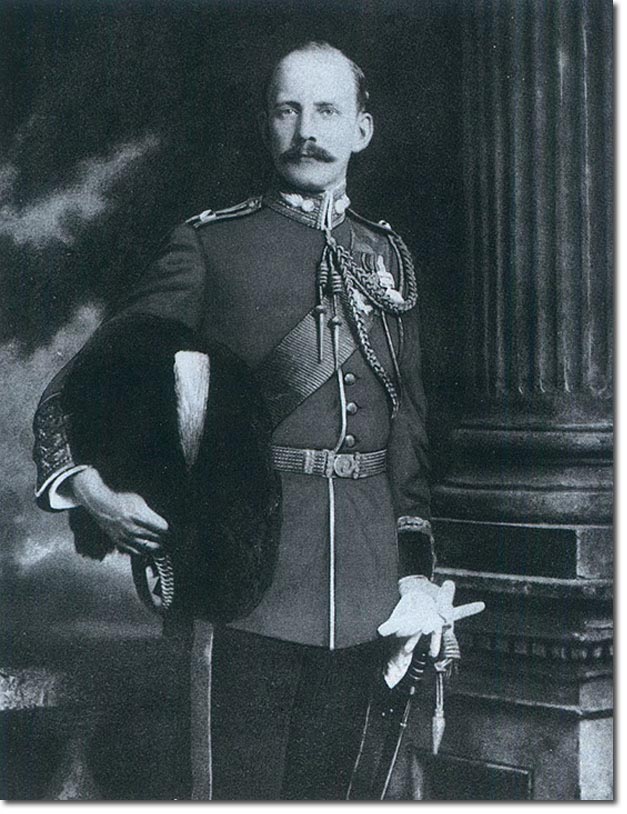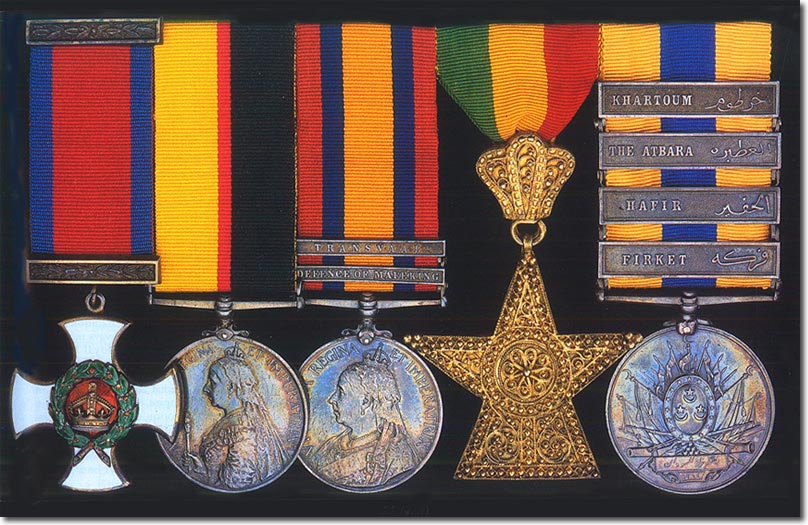|
|

 |
|
Lord Edward Cecil was Baden-Powell's Chief of Staff during the Defence of Mafeking. Latterly he was Director-General of Intelligence for the Sudanese Government and Financial Advisor to the Egyptian Government. He was born on 12 July 1867 the 4th son of the Prime Minister, Lord Salisbury. He joined the Grenadier Guards on 30 April 1887 and did 4 years regimental duty. He was a lieutenant in March 1892 and served as Wolseley's ADC in Ireland. In Nov 1892 he went on a diplomatic mission to Abyssinia where he was decorated by King Menelik with the 3rd Class of the Star of Ethiopia. He was then Kitchener's ADC in the Dongola expedition where he was in the thick of the fighting on 7 June and 19 Sep 1896. He was mentioned in despatches and promoted to major. He later joined the British officers of the Egyptian Army and once again served under Kitchener at the battles of Atbara and Omdurman. He received the DSO from the Queen at Windsor on 1 Dec 1898.
Described as a tall drooping, rather melancholy young officer. His mother dominated his life and when, during the siege, he received news of her death, he fell into a sad decline. But Baden-Powell was not impressed by his soldierly qualities, describing him as 'not much use'. To be fair he was ill for much of the time and he was given the task of commanding the Mafeking Cadet Corps, the prototype of the future Boy Scout movement. But Cecil is credited with being responsible for feeding the garrison during lengthy siege. He purchased 500,000 pounds worth of supplies prior to the siege. This was a deal made with Ben Weil to purchase the supplies despite the fact that Cecil did not have the money to pay for them. Weil was impressed with Cecil's connections and took the risk. When the siege was lifted there was still enough food to keep the town going for another month. The Boers, who tied up thousands of men in besieging Mafeking, were astounded that the town could hold out for 6 and a half months. Cecil's foresight was praised in Parliament by Arthur Balfour. In later life Cecil was living in Sussex with his wife Lady Violet who had scant regard for him. He hated the memory of Mafeking and when he heard that Baden-Powell was coming to live nearby he said "I dread anything that reminds me of that ghastly time, I really dread it." Lady Violet had been living in Cape Town while the siege was going on, and having an affair with Lord Milner. In 1912 he was appointed Financial Advisor to the Egyptian Government, having worked in various posts in the Sudan and Egypt for 9 years. His power was considerable, being described as one of the triumvirate ruling Egypt in 1914. He remained in that post until his death in 1918 at the age of 52. The obituary in The Times finished by saying of him: 'In him the British Empire loses a servant who worked for it with a single minded devotion to duty and without a thought of self-advancement. To his friends in Egypt and elsewhere (there were many) Lord Edward's charm of manner, ability to talk well and interestingly on almost any subject, and readiness to help and advise when asked, will always be a grateful memory.' |
 |
| The enamelled Distinguished Service Order cross on the left presented by Queen Victoria in 1898. Then the Queen's Sudan, then the Queen's South Africa with two clasps for Transvaal and the Defence of Mafeking. Next, the impressive and unusual Order of the Star of Ethiopia awarded to him by King Menelik in 1892. The medal on the right is the Khedive's Sudan medal 1896-1908 with four clasps inscribed in English and Arabic. As well as these he had the Most Distinguished Order of St Michael and St George, Knight Commander's set of insignia, and the Turkish order of the Medjidjie. These medals and decorations were sold at auction by Spink at a special Boer War Anniversary on 21 Oct 1999. The catalogue expected price was 10,000 - 15,000 pounds sterling. The information on Lord Edward Cecil is a shortened version taken from the catalogue. |
Armed Forces | Art and Culture | Articles | Biographies | Colonies | Discussion | Glossary | Home | Library | Links | Map Room | Sources and Media | Science and Technology | Search | Student Zone | Timelines | TV & Film | Wargames